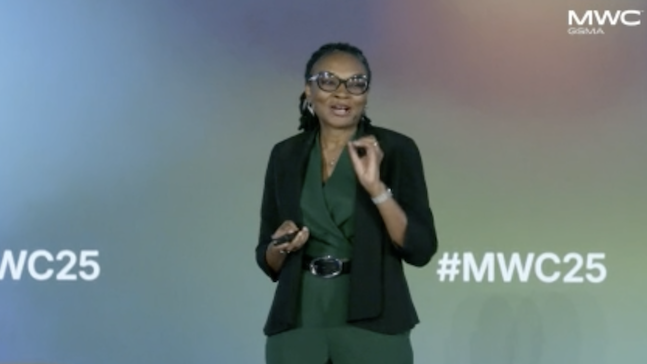
LIVE FROM MWC KIGALI 2025: Hydrogen Payment CEO Kemi Okusanya (pictured) highlighted interoperability as a key barrier to adoption of digital payments, insisting fixing the problem is essential to driving the next wave of fintech innovation in Africa.
Speaking during a section on Africa’s fintech outlook, Okusanya noted everybody has some form of digital means for making payments, but they do not speak to each other.
She acknowledged digital payments have made a significant progress “thanks to our friends in the telecoms space”, but pointed to fragmentation as a major problem.
To overcome this in Africa, she said the industry needs to think about interoperability across different countries and solutions, ensuring a user can transfer from a wallet to a bank account and from an account to a card. The key is to ensure the merchant does not have to worry about how to collect the payment.
“For us to crack that next growth phase, we have to think from the perspective of one Africa, 50-plus states and one payment rail”, or pathway.
Okusanya believes the sector will reach a point where wallets will not just be apps on smartphones, they will be in many forms, which she believes is going to make way for embedded finance.
She explained this is basically moving to the point where people make an order and the payment does itself.
Airtel Mobile Commerce Rwanda MD Jean Claude Gaga agreed the sector needs to focus on interoperability, suggesting fintech has reached a stage where it no longer looks at a smaller, closed-loop ecosystem.
He explained “whatever we’re building, we are looking at much bigger ecosystem. If you are looking to scale and make an impact”, you need interoperability.
Gaga highlighted the importance of SIM-swap APIs, giving the example of a financial company reducing fraud from between 12 per cent and 15 per cent to almost zero once it applied the interface into account opening processes.
Jean Bosco Iyacu, CEO of think tank Access to Finance Rwanda which is part of the Financial Sector Deepening network in Sub-Saharan Africa, argued it is difficult to use only one service, as many want to use multiple offerings to handle different needs.
Looking at the key barriers affecting fintech adoption in the region, he highlighted the vast majority of people living in rural areas are still excluded, and noted gender and education levels are also limiting factors.




